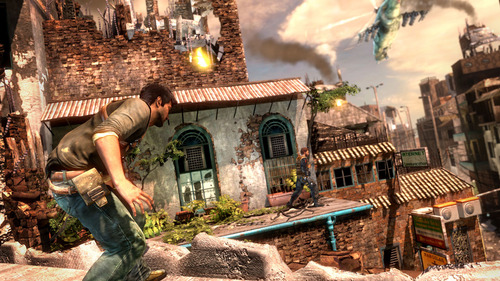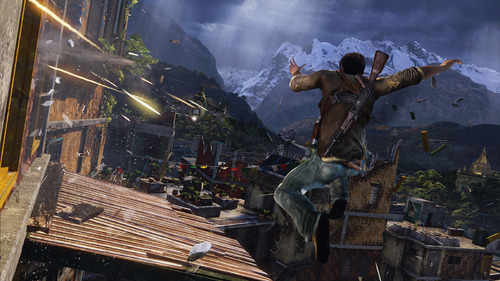I’ve always hated the term “cinematic” when applied to videogames.
Why is it, exactly, that the interactive entertainment industry has such a self-confidence problem that it feels the need to invoke a term that implies that, to be worthy of note, games must ape the best qualities of movies instead of playing to their own strengths?
The term always makes me think of franchises like Final Fantasy and Metal Gear Solid; games that are known for being as much non-interactive cutscene as they are actual gameplay. Or it might conjure the image of Devil May Cry or others of its ilk that seem to revel in taking the coolest moments out of the player’s control and placing them in movies, as if afraid letting the player have fun would have spoiled the cool action movie moment the developers had in mind.
Obviously these trends aren’t inherently abhorrent and universally reviled. The franchises mentioned above happen to be rather popular, in fact. I’d go so far as to say there’s even a place for this type of game design in the market, so long as gamers know what they’re getting into. I’ve been lured in by the production values of Final Fantasy’s cutscenes many a time, I’ll admit.
But, as entertaining as such games can be, they don’t play to the strengths of an interactive medium. The second group, that which takes fun moments out of the player’s hands at key moments and lets a cutscene take over, is especially destructive. In their attempt to mimic a medium seen as “better”, these titles harm their own enjoyment by ripping control from a player’s hands.
There was a time when such a move would have been appreciated. Only a console generation or two ago, graphics were insufficient enough that such a scene would have been considered a reward, not a punishment. Even though a cutscene was non-interactive, it could show events completely out of the question were the player to remain in control, thus making it fun.
But that time has passed.

Games like God of War III, Uncharted 2, and even, surprisingly, Bayonetta, the offspring of primary offender Devil May Cry, show us that control does not have to be wrested from a player’s hands to have spectacular things occur. Consoles are powerful enough that interactivity can, and should, be maintained however possible at all times. The sense of immersion, of player accomplishment, and of connection to the game world will be much higher as a result.
So gaming has come far enough to prove it doesn’t need to be “cinematic” to succeed. Its own strengths are enough to carry it. But still we see the term stick around, especially if a PR person happens to be around. For some reason it remains a selling point.
Where does this leave us? With the term constantly batted around like some deceptive holy grail and other games proving it’s completely unnecessary, will any game manage to emerge that proves, once and for all, that “cinematic gaming” is actually a useful concept worthy of our admiration?
Yes, actually, surprised though I am to hear myself admit it.
Uncharted 2 has managed to remind me that movies possess other qualities worthy of admiration besides the obvious bits of being pretty and non-interactive. The game absolutely nails these aspects, though they remain ethereal and hard to define. Once you play the game, you’ll know the feeling.
Uncharted 2 has the brilliant, gripping pace of a good action movie. The scenes, whether interactive or not, flow together seamlessly, keeping the player immersed like in a movie. The dialog is natural and has animations to match, creating characters that feel not like stiff automatons, but like actual people that exist in the same world and interact realistically with one another. The camera isn’t fully automated, like God of War, but somehow manages to subtly swing around and highlight the most important elements, framing key shots carefully and beautifully just like a movie’s cinematographer might. Most importantly, it manages to feel epic and spectacular, full of memorable moments and glorious set pieces like a big-budget action movie, all while keeping control in the player’s hands. There are non-interactive moments to be sure, but the player gets to do all the fun stuff himself.
In short, Uncharted 2 manages to give the player the feeling of controlling an action movie. Like no other game before it, Uncharted 2 really does manage to feel like an interactive movie in a way that seems totally positive and lacks any of the derivative “me too” desperation that seems to follow efforts like Heavy Rain.
It doesn’t need tons of quicktime events like Heavy Rain, it doesn’t need to wrest control from the player every five minutes like Final Fantasy, and it doesn’t even need to cheat and give “control” to the fancy bits via simon says minigames like God of War.
Control is the key word. Uncharted 2 feels like controlling an action movie, with all of the subtle details that entails. It may be hard to define, but it’s a glorious experience.
I never thought I’d say this, but not only can “cinematic gaming” be possible, it can also be a good thing. It’s too bad the vast majority of uses for the term are harmful and misleading. We need more games like Uncharted 2 to show us the way.


